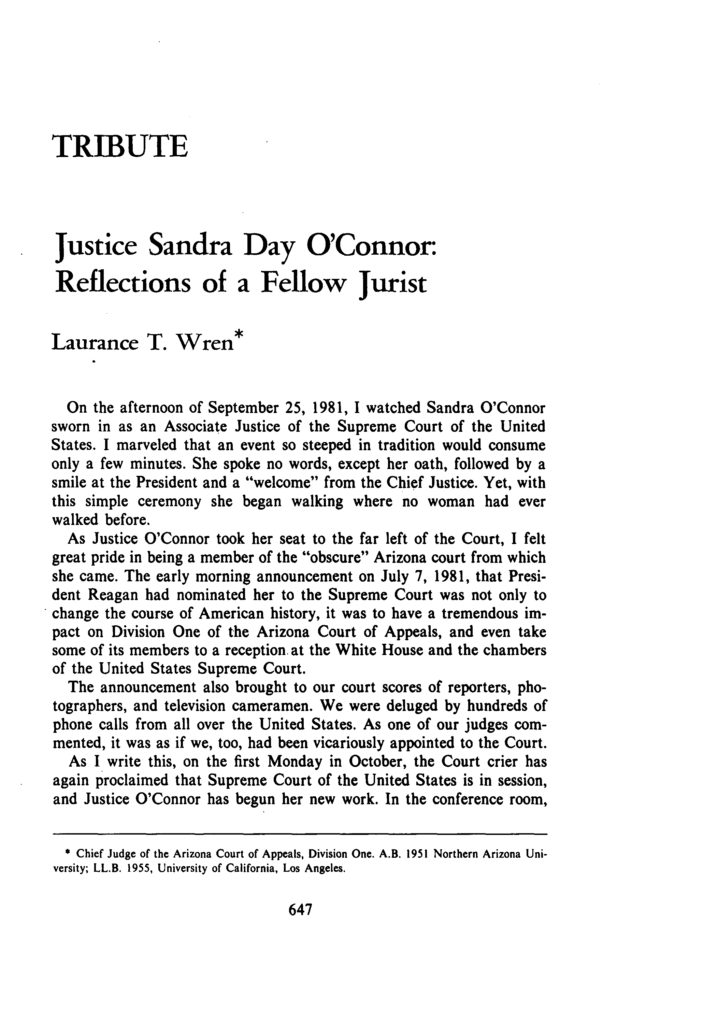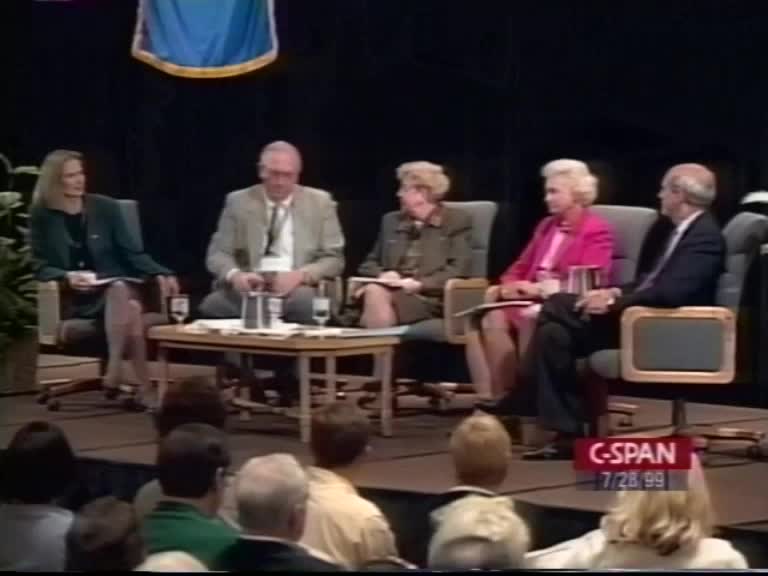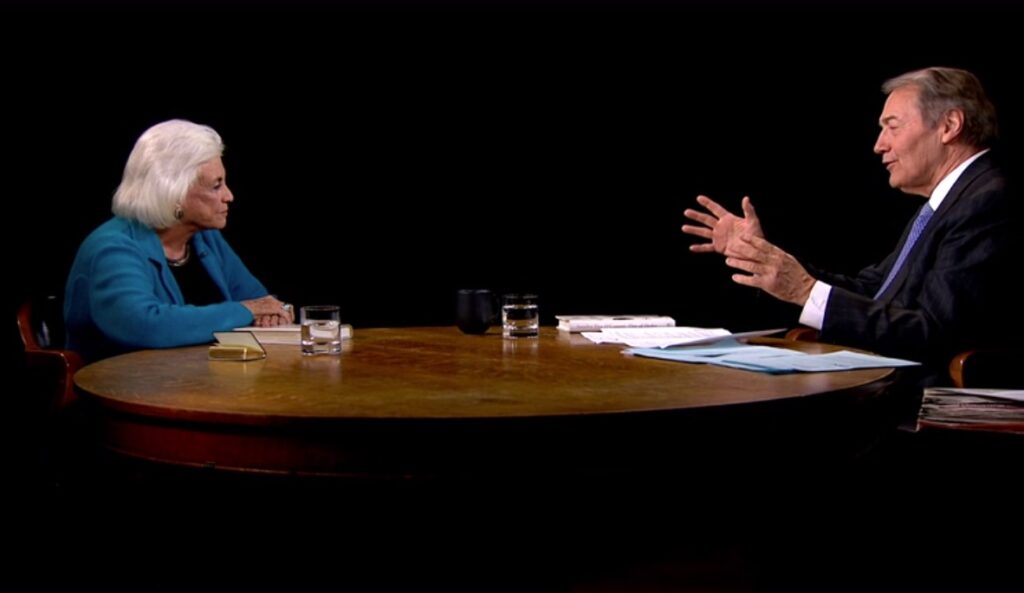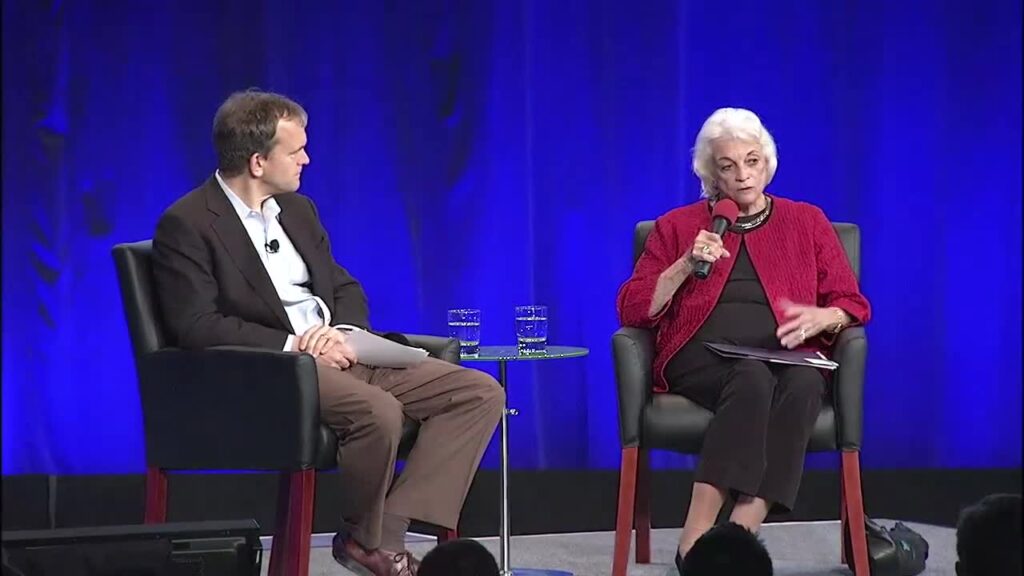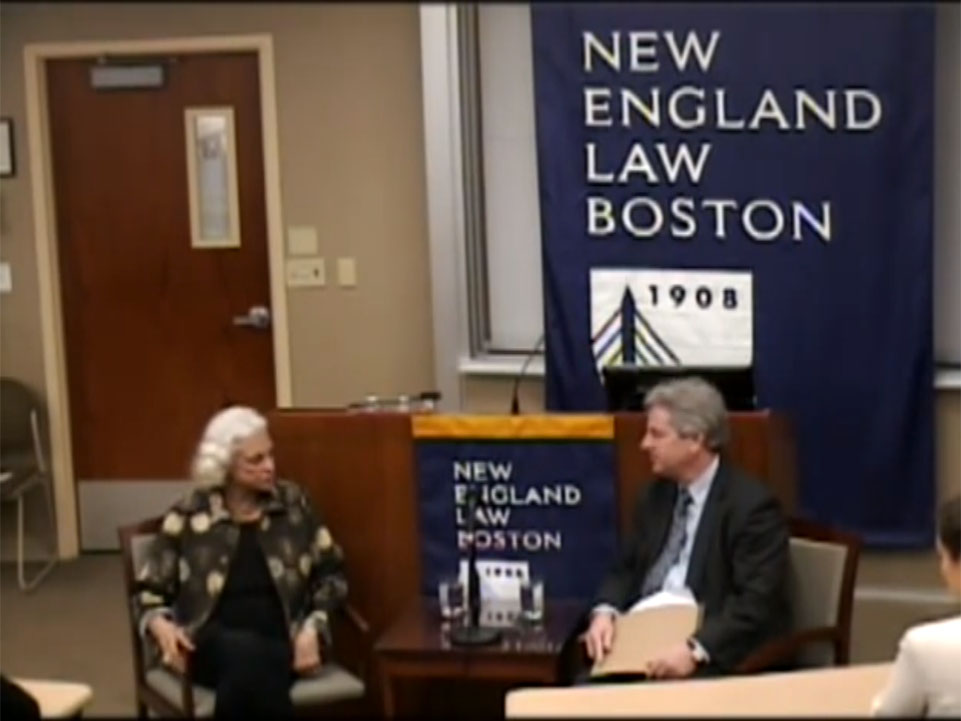Justice Sandra Day O’Connor: Reflections of a Fellow Jurist
TRIBUTE
Justice Sandra Day O’Connor: Reflections of a Fellow Jurist
Laurance T. Wren*
On the afternoon of September 25, 1981, I watched Sandra O’Connor sworn in as an Associate Justice of the Supreme Court of the United States. I marveled that an event so steeped in tradition would consume only a few minutes. She spoke no words, except her oath, followed by a smile at the President and a “welcome” from the Chief Justice. Yet, with this simple ceremony she began walking where no woman had ever walked before.
As Justice O’Connor took her seat to the far left of the Court, I felt great pride in being a member of the “obscure” Arizona court from which she came. The early morning announcement on July 7, 1981, that Presi dent Reagan had nominated her to the Supreme Court was not only to
change the course of American history, it was to have a tremendous im pact on Division One of the Arizona Court of Appeals, and even take some of its members to a reception. at the White House and the chambers of the United States Supreme Court.
The announcement also brought to our court scores of reporters, pho tographers, and television cameramen. We were deluged by hundreds of phone calls from all over the United States. As one of our judges com mented, it was as if we, too, had been vicariously appointed to the Court. As I write this, on the first Monday in October, the Court crier has again proclaimed that Supreme Court of the United States is in session, and Justice O’Connor has begun her
Conversation with Justice Stephen Breyer and high school students on how the Supreme Court works
Sandra Day O’Connor Are we in communication now with O’Connor high school? Unknown Speaker Yes, ma’am. Sandra Day O’Connor Thank you. Okay. I’m Sandra Day O’Connor, an Associate Justice here at the Supreme Court. And I’m appearing here this morning with my colleague, Justice Stephen Briar. And we’re delighted to have this hour to spend with some students and talk to you a little bit about what we do and what it is. The Supreme Court does, and I think we’re going to start off with Justice Briar, because he has done this program once before, so he’s had all the experience and we’re going to start off with justice Briar. Right? I’d like but you’re in the Benjamin Banneker academic High School. Stephen Breyer All right over there. We have the Mount Vernon High School over here. Good. And we have the Sandra Day O’Connor. Hi. I haven’t forgotten the honor High School. Down here. Is that right? Yes, they say that they’re there at a long distance there in Texas. That’s right. Very lucky there. And I guess it’s the the 10th 11th and 12th grades 12th grades 11th grade, just 12 fine. Okay, then your experts. All right by this. Let me Can I ask you a couple of questions of what your idea is. I would like to know if somebody says to you now there is a legal case going on a case of law. In a court, what do you think it could be about? What are the what kinds of things? Could it be about? This Any question? Anything can be anything it could be about? copyright, it could be about copyright.
Panel discussion with Justice Stephen Breyer and judges from the Ninth Circuit Court of Appeals
Stephen Breyer Justice is Sandra Day O’Connor and Stephen Brier participate in a question and answer session with judges of the ninth us Circuit Court of Appeals. This event took place at the circuits annual Judicial Conference held this year in Monterey, California. It lasts an hour. Unknown Speaker Judge case and mythos p&i are the live in the water be at the opportunity to carry on this conversation with our justices. I’m not going to make any elaborate introductions. All I’m going to say is this is not Judge Judy, and matters not judge Walker. Unknown Speaker The usual custom. We’re going to start off with a question to the junior justice. Unknown Speaker Several factors influenced the members of the conference. But to choose, as the theme for this conference, the importance of the independent judiciary in securing a free democratic society for its citizens. Many of us have had an opportunity to observe firsthand the corrupt and proven sighs legal systems of the country’s emerging from dictatorial systems, the contrast to our own legal system, but home the preciousness of our system, and we have the striking criticism of judges by politicians on both sides of the aisle. The bear incident was produced over judicial confirmations have suggested that we need to pay heed preservation of our own independent judiciary asking just just prior to see a real threat to our traditional independence, or is this just business as usual? And do you have any suggestions as to how we might
Interview with Charlie Rose
Charlie Rose: In 1981 she became the first woman to serve on the United States Supreme Court. Many have called her the most important woman in American history In 1952 when she graduated from Stanford Law School, most firms would not hire her because of her gender but she was not deterred. She quickly rose to the top of the legal profession. For nearly 25 years she was the swing vote on the court on issues ranging from affirmative action to abortion to campaign finance. She left her post as Associate Justice in 2006. She has written a new book about the history of the Supreme Court. It is called “Out of Order”. I am pleased to have Justice Sandra Day O’Connor back at this table. Welcome.
Sandra Day O’Connor: Thank you. It’s good to be here.
Charlie Rose: Business first. All right?
Sandra Day O’Connor: All right.
Charlie Rose: Business first. You gave me this.
Sandra Day O’Connor: I did.
Charlie Rose: When I saw you a couple of days ago.
Sandra Day O’Connor: I did.
Charlie Rose: And you’re not getting it back.
Sandra Day O’Connor: No, I didn’t expect to.
Charlie Rose: OK in fact you wouldn’t take it. But I have this one which ha my name on it. And so I’m giving it you.
Sandra Day O’Connor: Is that right?
Charlie Rose: That’s exactly right.
Sandra Day O’Connor: But this is weathered and has a name.
Charlie Rose: That’s why I want to you have it.
Sandra Day O’Connor: And gold on the pages.
Charlie Rose: And proudly I want you to have this.
Sandra
In Search of a “Grand Unified Theory”: Thirty Years with the Endorsement Test
Sandra Day O’Connor Thank you so much. Thank you, our former national Secretary of Education, he did a great job in that position for the nation. And I really enjoy being in your state and in your beautiful city of Charleston. And being part of a program put on by this relatively new law school, you’re doing a super job. And I think this seminar that you put on, is going to register throughout the country, be sure you publish the talks that were given in your law review, or some similar publication, because I think the remarks have been very informative, very helpful, very thorough. So don’t let them get away, make sure they’re available for circulation nationwide. And I’m so glad to be here.
Now, I’m going to bore you with a little more about the endorsement principle, if you can stand it, you think you can for a few minutes. I’m so glad to be part of the program today. The establishment clause has been very much of interest to me, particularly when I served on the Supreme Court. And I am really pleased that the law review here and the law school has chosen to provide such a marvelous program in it on it today. It’s great. And I think the interest in the Establishment Clause is well deserved. religious pluralism lies at the very heart of the American political tradition. And I think it remains a major concern, as our country becomes ever more of our own, have larger and larger communities of people from widely different ethnic and religious backgrounds around the world. I mean,
A Concurrent Resolution on the death of President Lyndon B. Johnson (co-sponsor with entire Senate)
SENATE CONCURRENT RESOLUTION 1009 A CONCURRENT RESOLUTION ON THE DEATH OF PRESIDENT LYNDON B. JOHNSON The sudden death of the
A Concurrent Resolution on the death of President Harry S. Truman (co-sponsor with entire Senate)
SENATE CONCURRENT RESOLUTION 1010 A CONCURRENT RESOLUTION ON THE DEATH OF PRESIDENT HARRY S. TRUMAN. Arizona joins the Nation and
Interview for Talks at Google
Kent Walker So, as you may have guessed, I am I am excited and truly honored to welcome to Google. Somebody who is a historic figure in American law. Justice Sandra Day O’Connor was nominated to the court as the first woman on the Supreme Court in 1981. Serve until 1986. With with High Distinction, since that time has been a leader in the effort to educate America’s kids about governance and civics and we’ll talk a little bit at the end of today’s presentation about some of the efforts along those lines using technology to try and help educate the leaders of tomorrow on those issues. She won the Presidential Medal of Honor was awarded the Presidential Medal of Freedom by President Obama in 2009. And in has more recently, as you see, attended our fat guy session and had a conversation covering a lot of fascinating issues with regard to trends in the law, the current situation we have in our country with regard to politics and governance, and a lot of other issues. So I’m delighted to be able to continue that conversation today. And and Welcome to Google Justice Sandra Day O’Connor. Okay. Sandra Day O’Connor Give me a little background, if you would, do you provide occasional talks from people here? Just as like you have 24 cafes and you have X number of talks? Kent Walker We do we have, ranging from presidential candidates to authors to we’ve had chefs come through any number of Sandra Day O’Connor that’s a nice idea. Have you had any presidential candidates yet? Kent Walker
Interview at New England Law School in Boston
Host
Hello, everyone here. What a tremendous honor an opportunity is. I have just to stand
Host
with us today. Certainly, if there was anyone, no introduction, Host justice.
Host
Justice. Justice O’Connor was nice enough to come here at the invitation of student in 1991. Angela Bucci then now Angela Paulus, a member of the room Island bench. Haha, wrote tirelessly suggesting so kinda about the history of this law school established exclusively for women and justice. So kinda graciously came here 1991 she was the first justice to have a portrait Host of Georgetown at night and Aaron said yes,
Host
it’s still there.
Host
That’s never going anywhere.
Host
But she also was nice enough to come back for our hundred anniversary where she was the keynote speaker of the Boston Garden. You can still see that on the website, if you care to I think it was a wonderful day for the last book. Obviously enhanced exponentially because just so kind of was willing to be with us as is Today, I don’t think it’s a good idea for me to take all of her time. We’ve agreed upon a little bit of a format with everyone’s doctrines. And the first thing I’d like to let you know, we’re going to talk about a couple of issues that Justin so kind of strongly about, and that will take some questions. But I would like to welcome everyone to thank you so much.
Host
Thank you. Host And, again, trying to keep in mind the theme here of this to the students today. Joy company. We’ve been fortunate to spend some


